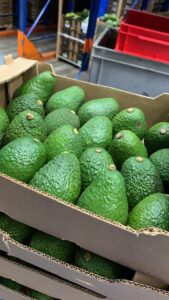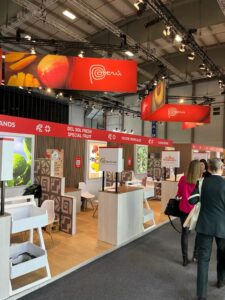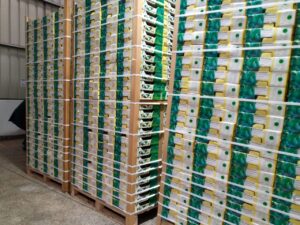Africa: Facing global competition in the agricultural sector
- 16
- Apr
 Agriculture is the dominant activity for most people in Africa, a source of employment and income for a majority of the population. According to the Food and Agriculture Organization (FAO), it’s the main labor force and accounts for most of the continent’s GDP.
Agriculture is the dominant activity for most people in Africa, a source of employment and income for a majority of the population. According to the Food and Agriculture Organization (FAO), it’s the main labor force and accounts for most of the continent’s GDP.
Agriculture is the main activity for most people in Africa due to its significant contribution to the continent’s GDP, employment, and export earnings. About 90 percent of the population is engaged in agriculture this includes a large proportion of young people and women. According to the World Bank, the agricultural sector in Africa employs over 60% of the population and contributes about 15% to the continent’s total GDP. Additionally, agriculture accounts for a significant portion of Africa’s export earnings, providing foreign exchange that is essential for economic growth and development. 60 percent of Africa’s land is arable, and based on soil tests to confirm that specific fields are suitable to produce crops, food can be produced not only for consumption but also for export which adds financial freedom for many farmers.
It could be easy to conclude that with all these advantages, Africa is postured to play the leading role in the global food trade since farming is the dominant activity. However, that is not the case. In fact, African food products, especially in the agri sector, face very stiff competition in world markets and in the EU from many other regions – Latin America specifically. Why is it that Africa, so near in Europe in terms of distance and history has these difficulties? This is all the more surprising given that Africa has unique products like tea and coffee with flavours that cannot be found anywhere else in the world, and that the continent has made significant strides in recent years toward sustainable agriculture practices. Yet despite all this, Africa is still facing obstacles to overcome to enter and establish its place in international trade in agriculture. In fact, one of our customers told me that “We chose Peru because our clients want Peru products”. This stimulated me to do some research to find out why is that so? What could possibly explain this? And what must African exporters do to stand out?
Research showed me that there are several reasons that explain this dynamic and what Africa must do to take its rightful place at the round table of international trade. I am going to take the case of avocados as an illustration. But these lessons here apply to any other crop.
Why do some clients prefer to buy from Latin American producers rather than from African producers?
 Africa and Latin America produce many similar crops. For example, ginger, mangoes, pineapple, and avocados to name a few. As such, competition is fierce. One of the reasons some clients may prefer products from Latin America is because of the taste. Avocados for example from Latin America – Peru in particular – are creamy in texture with a mild flavor. So, some people may prefer this.
Africa and Latin America produce many similar crops. For example, ginger, mangoes, pineapple, and avocados to name a few. As such, competition is fierce. One of the reasons some clients may prefer products from Latin America is because of the taste. Avocados for example from Latin America – Peru in particular – are creamy in texture with a mild flavor. So, some people may prefer this.
The next factor is quality. Growers of avocados in Peru, or Mexico have invested in advanced technology and production methods to ensure that their fruit meets high standards for size, shape, color, and ripeness. This can result in a more consistent and visually appealing product that is more likely to meet the expectations of consumers.
One other possible reason that can explain the consistency of the quality of avocados from Latin America is the difference in growing conditions and production methods between a country like Peru and Africa. Peru has a favorable climate for avocado cultivation, with many farms located in the highlands where temperatures are cooler and rainfall is more consistent. As such the avocados could be the same each time they are harvested. In contrast, many African countries experience more variable weather patterns, which can affect crop yields and quality.
In addition, a country like Peru has strict agricultural standards and regulations for its agriproducts like avocados. This might explain the consistency in their quality. Whereas in Africa exporters have to figure that out most of the time by themselves. And these services of market access to Europe do not come cheap either for some. This might be challenging for smallholder farmers who want to take their businesses to the next level.
Another factor that may influence clients’ preferences for Latin American products over African products is the supply chain logistics. In countries like Peru, Costa Rica, Brazil, Mexico, etc., there are well-established export channels and infrastructure for transporting products like avocados to international markets, which can make it easier and more cost-effective for clients sourcing from these regions. In contrast, some African countries may face challenges with transportation and logistics, which can result in longer delivery times, higher costs, and greater risks of spoilage or damage during transit.
Finally, there may be differences in pricing between Latin America and African products that could impact buyer preferences. Depending on market conditions and supply levels, one region may offer more competitive pricing than the other, which could influence where clients choose to trade with.
How can African products attract more clients and beat their competition in global trade?
One of the ways to stand out in international trade is to create a fair trade for exporters and their products. So how should African businesses go about this?
 One of the most important things African businesses can do to stand out and attract more customers is to improve the quality of their products. This can be achieved by investing in knowledge and skills development training like in better production processes, using high-quality materials like with packaging, and ensuring that their products meet international standards and certifications. This is a must-have to ensure quality. Governments, donor organisations, investors, in short those who genuinely want to help should take it as a mission to assist exporters by subsidizing this very important service for this will help sellers to be self-reliance instead of waiting for the governments for jobs year in and year out. By offering high-quality products, African exporters can differentiate their offerings from those of the competition and from other countries, and make more profits.
One of the most important things African businesses can do to stand out and attract more customers is to improve the quality of their products. This can be achieved by investing in knowledge and skills development training like in better production processes, using high-quality materials like with packaging, and ensuring that their products meet international standards and certifications. This is a must-have to ensure quality. Governments, donor organisations, investors, in short those who genuinely want to help should take it as a mission to assist exporters by subsidizing this very important service for this will help sellers to be self-reliance instead of waiting for the governments for jobs year in and year out. By offering high-quality products, African exporters can differentiate their offerings from those of the competition and from other countries, and make more profits.
Another key factor in attracting more business for African exporters is pricing. African exporters should strive to offer competitive prices that are comparable to or lower than those offered by their competition in the same product or market from other countries. This can be achieved by optimizing production processes to reduce costs, negotiating better deals with suppliers, and leveraging economies of scale.
Furthermore, African exporters need to provide excellent customer service. This is very important for attracting new buyers, especially EU buyers. African exporters should be responsive to customer inquiries and complaints, offer fast shipping and delivery times, and provide clear and accurate product descriptions/specifications. By building a reputation for excellent customer service, African exporters can establish trust with EU buyers and increase the likelihood and repeat business with clients.
Again, promoting unique selling points is another effective way that African exporters can attract new clients for their business. For instance, it could be highlighting the cultural or artisanal aspects of their products, emphasizing the sustainability or ethical sourcing of their materials which at this moment is very crucial in accessing the EU market or showcasing the social impact of their business on local communities. By highlighting what makes their products unique, and stand out, African sellers can differentiate themselves from their competition and appeal to EU clients who value authenticity and social responsibility. Also, with sustainability, African exporters in particular, and sellers, in general, can help to strengthen their competitive position now in Europe.
Finally, African sellers can leverage digital marketing tools and platforms to reach a wider range of audience and promote their products all over the world. This could include creating a website or online store, using social media to engage with potential customers directly, or partnering with companies, distributors, experts, influencers, or bloggers to showcase their products. By using digital marketing effectively, African sellers can increase their visibility and attract more clients to their products, in the EU for example.
In conclusion, Africa has enormous potential in the agri-products market space on the global stage, but it needs to address several challenges to compete in the global market effectively. By investing in training for knowledge and skills enhancement to improve quality, work on their pricing strategy, provide excellent customer service, highlight their unique selling points, and leverage digital marketing, African exporters can increase their competitiveness and become major players in the global agri-products market.
EuroAfri Link (EAL) is there to support African exporters in their efforts to access European markets and European buyers with confidence. We are focused on closing the gender gap and creating a win-win collaboration in smart trade that is inclusive, sustainable, and fair. You can join our training program about Direct access to the EU market from Africa to see how it is done.
Join us and be part of the solution!
Author: Patience Chindong, CEO of EAL
The content of this blog is the sole responsibility of the author.
